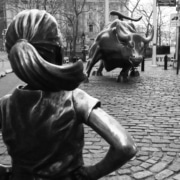Business Roundtable Wants Fair Employee Payment, But What About Agency?

Well into his 30s, my father ran a pool-plumbing business that just got us by: Sometimes clients wouldn’t pay, and when they did, it wouldn’t be uncommon for checks to bounce. His workers would demand higher wages while he would often have to fix poor work on-site, which would cut into his budget and time. I remember my father feeling despondent and trapped in this job. He got out, though, in the early 2000s, when he discovered the stock market. In those days it was easy, if rare, for a novice day-trader to make tens of thousands of dollars, at home, in a few hours. It could be stressful work—he’d sometimes lose thousands quickly, too—but he enjoyed it. He loved the freedom. He worked for and with no one but himself.
I thought about this as I read philosopher Elizabeth Anderson’s latest book, Private Government: How Employers Rule Our Lives (and Why We Don’t Talk About It). She opens by asking us to “consider some facts about how employers today control their workers.” These facts stand in stark contrast to the solitary independence my father experienced. Anderson writes:
Walmart prohibits employees from exchanging casual remarks while on duty, calling this “time theft.” Apple inspects the personal belongings of their retail workers, who lose up to a half-hour of unpaid time every day as they wait in line to be searched. Tyson prevents its poultry workers from using the bathroom. Some have been forced to urinate on themselves, while their supervisors mock them. About half of the U.S. employees have been subject to suspicionless drug screening by their employers. Millions are pressured by their employers to support particular political causes or candidates.
She goes on to say that these employees would rightly challenge this treatment if the U.S. government imposed it, because such treatment would violate their constitutional rights. But the American workplace doesn’t afford employees those basic protections. To speak out about infringements of privacy and autonomy can get people fired, so most keep quiet.
Surveillance, suspicionless searches, forbidden forms of speech—these are the hallmarks of a communist dictatorship. And that’s precisely how Anderson, knowing how surprising it would sound to most Americans, would characterize the economic system of the modern workplace today.
From this perspective, the very first sentence of the Business Roundtable’s announcement becomes suspect.
“The government—that is, the establishment—owns all the assets,” she writes, “and the top of the establishment hierarchy designs the production plan, which subordinates execute.” Of course, by likening most workplaces to communist dictatorships, she is not implying that bosses today have the power to put disobedient employees in gulags. But she is saying that these private governments do “impose controls on workers that are unconstitutional for democratic states to impose on citizens who are not convicts or in the military.” That’s quite an indictment.
But don’t get her wrong. Anderson is not against capitalism. She’s all for big corporations that have significantly contributed to societal progress—by, for example, generating wealth, helping to raise living standards, and providing essential goods and services. “I embrace the prosperity that can only be achieved through large-scale workplaces, and accept that the only feasible way to govern such complex workplaces involves a hierarchy of offices, and hence authority,” she writes. It may well be true that owners and managers have special expertise in handling their firm’s capital, and that’s enough to justify control over it. But that control shouldn’t be unlimited, Anderson argues. “I object, not to limited government,” she writes, “but to private government—the subjection of workers to arbitrary, unaccountable government, in which they have no voice other than what their employers care to give them (which is often none at all) and are vulnerable to abuses of power.” Those include things like wage theft, which, according to one estimate, amounted to $50 billion in 2014; sweatshop-like conditions, which were discovered 93 percent of the time during investigations of Southern California garment factories from 2007 to 2012; and unreliable or unworkable employee work schedules that leave people unable to arrange child care or show up to a second job.
Research also supports a vision of workplace relations that does away with extreme power differentials. “Humans have a strong aversion to dominance, which is a result of our egalitarian nature that served us well in the small-scale societies in which we evolved,” Mark van Vugt, a professor of organizational and evolutionary psychology at Vrije Universiteit Amsterdam, told Ethical Systems. “One of the biggest causes of job dissatisfaction, people report, is the interaction with their line manager. Many people find this relationship extremely stressful, as it infringes on their sense of autonomy, to be dominated by someone who controls them and gives them orders.” Workers want to have a substantive voice. “They don’t want to be anonymous or bossed around,” van Vugt said. “They want to be able to participate in collective decision-making and keep their leaders in check.” Van Vugt also pointed out that research has found that organizations do much better, in terms of profits and job-satisfaction, when their employees are co-owners, like in cooperatives.
There is talk that leaders may start to become more responsive and attuned to the needs of employees. For example, the Business Roundtable, a non-profit association consisting of CEOs from some of the U.S.’s largest companies, like Apple and Walmart, announced recently that, henceforth, the leaders of America’s major companies would strive for decency alongside profits. “Americans deserve an economy that allows each person to succeed through hard work and creativity and to lead a life of meaning and dignity,” the group said in a statement. For employees, this means their companies will be “investing” in them. The CEOs of the Business Roundtable say they commit to, as a start, compensating their employees “fairly and providing important benefits” and “supporting them through training and education that help develop new skills for a rapidly changing world” while fostering “diversity and inclusion, dignity and respect.”
But this could ultimately amount to cheap talk. No mention, for instance, was made of reducing the exorbitant pay CEOs receive relative to the median salaries of employees or of any plans to implement fair compensation or benefits, which is said to be forthcoming. But the statement is still newsworthy. On the surface, at least, it represents, as the New York Times put it, a break with “decades of long-held corporate orthodoxy.” That orthodoxy was principally espoused by economist Milton Friedman, who once declared that “the social responsibility of business is to increase its profits.” Darren Walker, the president of the Ford Foundation and a Pepsi board member, told the Times that the “ideology of shareholder primacy has contributed to the economic inequality we see today in America.” That ideology, Walker said, is so entrenched in the “psyche of investors and legal theory and the C.E.O. mind-set” that overcoming it “won’t be easy.”
But the problem with the modern workplace, according to Anderson, is deeper than the ideology of shareholder primacy. In Private Government, she explains what went wrong with free market society. Before the Industrial Revolution, the vision of a free market society was egalitarian. Nearly everyone would be self-employed—either as a farmer, an artisan, or a merchant—or would work for someone who was, with real potential for high and rising wages which could, after a time, fund new ventures. It had two major flaws, in that it relied on appropriating women’s labor and Native American lands—but it was a humane economic philosophy. “Material inequality would be limited to individual differences in personal labor effort and skill,” Anderson writes, “not to inequalities in birth, state-granted privileges, capital ownership, or command of others’ labor.”
But the Industrial Revolution’s economies of scale changed that. Material inequality along with aggregate wealth began to climb, opportunities for self-employment shrank dramatically in the course of the 19th century, and the employer-employee relationship, Anderson writes, dramatically shifted as a result. Where a few workers would once labor alongside a master to learn his craft, in fair working conditions, many workers began to take orders, often at a remove, from a superior who they did not work with, or next to, and who could allow the job to become unbearably toilsome. “Employers, instead of drinking with their workers, preached temperance, industry, punctuality, and discipline,” Anderson writes. “Conditions were harsh, hours long, wages low, and prospects for advancement, regardless of how hard one worked, minimal.” (The precedent for this management style may well have been set, not by the first industrial workplaces, but on American slave plantations, as York University professor of strategic management Bill Cooke explained in a 2003 paper; Princeton sociologist Matthew Desmond recently expanded on this thesis in the New York Times Magazine.)
From this perspective, the very first sentence of the Business Roundtable’s announcement becomes suspect. “America’s economic model,” it states, “is based on freedom, liberty and other enduring principles of our democracy…” Anderson disagrees. It’d be more accurate to say America’s economic model once had the potential to be freeing. But industrializing workplaces “perverted what was once a liberating, egalitarian vision into support for pervasive workplace authoritarianism—arbitrary, hierarchical, private government,” she writes. “The evolving rhetoric of laissez-faire liberalism that arose in the 19th century papered over the real issues and represented, in Orwellian fashion, subjection to freedom.”
In his 1906 novel The Jungle, muckraking journalist Upton Sinclair endeavored to lay some of those real issues bare. For seven weeks Sinclair worked undercover in Chicago—then the great maw of American capitalism—in the city’s meatpacking plants, taking notes on the sort of impoverished life the brutal job offered working-class people. The irony was that even though the novel had been hailed as “the Uncle Tom’s Cabin of wage slavery,” Sinclair ended up raising awareness, not of the inhumane treatment of workers, but of the unsanitary nature of meat production. He would later say of this unintended consequence that he had his sights on the public’s heart but instead hit its gut.
Anderson, for her part, has her sights less on the public’s heart than on its mind. In telling the history of free market ideals, she’s trying to dispel the illusion that we are as free as employees as we are as citizens:
Preindustrial labor radicals, viewing the vast degradation of autonomy, esteem, and standing entailed by the new productive order in comparison with artisan status, called it wage slavery. Liberals called it free labor…If one only looks at the conditions of entry into the labor contract and exit out of it, workers appear to meet their employers on terms of freedom and equality. That was what the liberal view stressed. But if one looks at the actual conditions experienced in the workers’ fulfilling the contract, the workers stand in a relation of profound subordination to their employer. That was what the labor radicals stressed.
And that’s what Anderson stresses. To correct course, she writes, workplaces need, as a start, something akin to a bill of rights against employers that guarantees workers have a say in how they’re governed. Current worker protections, like the Fair Labor Standards Act and anti-discrimination laws, only go so far as to check dictatorial employer power. The goal, for Anderson, is for workplaces to go beyond rule by enlightened despots.
Jonathan Haidt, the founder of Ethical Systems, made a similar point not long ago in a talk titled “Three Stories About Capitalism.” The first two stories—capitalism is exploitation, and capitalism is liberation—are true only in part, because both have it right. Capitalism is liberating because it enables constant innovation, Haidt said, but that also includes new ways of exploiting the people businesses interact with: employees, suppliers, consumers, and the community broadly. “We have to constantly be vigilant about new forms of exploitation. We have to push back against them, ideally with social, moral, financial and, when necessary, legal means,” Haidt said. “What we’re hoping to get is dynamism with decency.”
Earlier this year, when the Business Roundtable decided it would announce a less shareholder-centric purpose for corporations, Alex Gorsky, the CEO of Johnson & Johnson, got the job of crafting the statement’s language. He told the New York Times that “there were times when I felt like Thomas Jefferson.” Jefferson was, of course, one of the most radical of the American revolutionaries, a despiser of despots and other forms of centralized or concentrated authority. If Anderson got wind of his remark, I can imagine her thinking it rather odd coming from a CEO, which, to her, is just another name for a dictator.
Brian Scott Gallagher is Ethical Systems’ Communications Director. Follow him on Twitter @bsgallagher.
Lead image: rawpixel.com.








